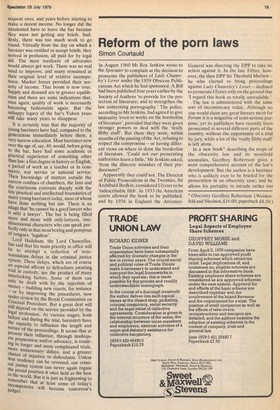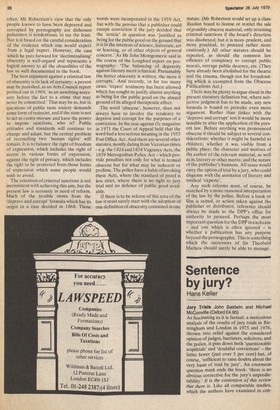Reform of the porn laws
Simon Courtauld
In August 1960 Mr Roy Jenkins wrote to the Spectator to complain at the decision to prosecute the publishers of Lady Chatterley's Lover under the 1959 Obscene Publications Act which he had sponsored. A Bill had been published four years earlier by the Society of Authors `to provide for the protection of literature; and to strengthen the law concerning pornography.' The police, according to Mr Jenkins, had agreed to give immunity 'even to works on the borderline of literature', provided that they were given stronger powers to deal with the 'really filthy stuff. But there they were, within months of the passing of the Act, refusing to respect the compromise — or having different views on where to draw the borderline of literature. 'Could not our prosecuting authorities learn a little,' Mr Jenkins asked, 'from the illiterate mistakes of their predecessors?'
Apparently they could not. The Director of Public Prosecutions in the Twenties, Sir Archibald Bodkin, considered Ulysses to be 'indescribable filth'. In 1933 the American courts allowed the book to be published, and by 1936 in England the Attorney General was directing the DPP to take no action against it. In the late Fifties, however, the then DPP Sir Theobald Mathew — he who elected to bring proceedings against Lady Chatterley's Lover — declined to prosecute Ulysses only on the ground that 'I regard this book as totally unreadable.'
The law is administered with the same sort of inconsistency today. Although no one would claim any great literary merit for Forum it is a magazine of semi-serious purpose; yet its publishers have recently been prosecuted in several different parts of the country, without the opportunity of a trial by jury, while a lot of the 'really filthy stuff is left alone.
In a new book* describing the scope of the obscenity law and its manifold anomalies, Geoffrey Robertson gives a most comprehensive account of the law's development. But the author is a barrister who is unlikely ever to be briefed for the prosecution in an obscenity case; and he allows his partiality to intrude rather too often. Mr Robertson's view that the only people known to have been depraved and corrupted by pornography are dishonest policemen is tendentious, to say the least. Nor is it based on the careful consideration of the evidence which one would expect from a legal expert. However, the case which he puts forward for 'decriminalising' obscenity is well-argued and represents a logical answer to all the absurdities of the law so well documented in the book.
The best argument against a criminal law of obscenity is its lack of certainty: a person may be punished, as an Arts Council report pointed out in 1969, 'as an unwitting accessory before the fact to a crime that may never be committed.' That may be so, but in questions of public taste society demands some form of restraint, and if the state is not to act as custos morum and have the power to impose sanctions, who is? Public attitudes and standards will continue to change and adapt, but the central problem of reconciling two 'human rights' will remain. It is to balance the right of freedom of expression, which includes the right of access to various forms of expression, against the right of privacy, which includes the right to be protected from those forms of expression which some people would wish to avoid.
The retention of criminal sanctionsis not inconsistent with achieving this aim, but the present law is seriously in need of reform. Much of the trouble stems from the 'deprave and corrupt' formula which has its origin in a case decided in 11868. Those words were incorporated in the 1959 Act, but with the proviso that a publisher could escape conviction if the jury decided that the 'article' in question was 'justified as being for the public good on the ground that it is in the interests of science, literature, art or learning, or of other objects of general concern.' As Mr John Montgomerie said in the course of the Longford report on pornography: 'The balancing of depravity against literary merit is farcical. Presumably the better obscenity is written, the more it corrupts.' And recently, in far too many cases, 'expert' testimony has been allowed which has sought to justify almost anything as being for the public good on the absurd ground of its alleged therapeutic effect.
The word 'obscene', however, does not always have to involve the tendency to deprave and corrupt for the purposes of a conviction. In the case against Oz magazine in 1971 the Court of Appeal held that the word had a less serious meaning in the 1953 Post Office Act. And there are several other statutes, mostly dating from Victorian times —e.g. the 1824 and 1838 Vagrancy Acts, the 1839 Metropolitan Police Act — which provide penalties not only for what is termed obscene but for what may be indecent or profane. The police have a habit of invoking these Acts, where the standard of proof is less strict, where there is no right to jury trial and no defence of public good available.
If there is to be reform of this area of the law it must surely start with the adoption of one definition of obscenity contained in one statute. (Mr Robertson would set up a classification board to license or restrict the sale of possibly obscene material, only retaining criminal sanctions if the board's direction was disobeyed; but it is more prudent, and more practical, to proceed rather more cautiously.) All other statutes should be repealed, as should the common law offences of conspiracy to corrupt public morals, outrage public decency, etc. (They have already been abolished for the theatre and the cinema, though not for broadcasting which is exempted from the Obscene Publications Act.) There may be plenty to argue about in the present statutory definition but, where subjective judgment has to be made, any new formula is bound to provoke even more argument. Rather than tinker with the 'deprave and corrupt' test it would be more sensible to alter the application of the present law. Before anything was pronounced obscene it should be subject to several considerations: whether it might be harmful to children; whether it was visible from a public place; the character and motives of the author of the relevant material, as well as its literary or other merits; and the nature of the publisher's business. All cases would carry the option of trial by a jury, who could dispense with the assistance of literary and medical 'experts'.
Any such reforms must, of course, be matched by a more reasoned interpretation of the law by the police. Before a book or film is seized, or action taken against the publisher or distributor, reference should always be made to the DPP's office for authority to proceed. Perhaps the most important question for the DPP in each case — and one which is often ignored — is whether a publication has any purpose beyond the pornographic. This is something which the successors of Sir Theobald Mathew should surely be able to manage.







































 Previous page
Previous page